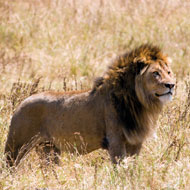“This demonstration that trophy hunting can potentially push otherwise resilient populations to extinction when the environment changes is concerning."
Scientists study the impact of hunting and environmental change
Trophy hunting that involves targeting high quality males could lead to the extinction of species facing environmental change, new research has found.
Recreational hunters often target male animals with large secondary sexual traits, such as antelope horns, deer antlers and lions’ manes. For the same reason, some insect collectors will pay high prices for specimens such as stag beetles.
These individuals tend to be the most evolutionarily fit, so removing them takes the best genes out of the population.
Scientists from the Queen Mary University of London (QMUL) used a computer simulation model to predict the impact of selectively targeting animals on the basis of these secondary sexual traits, and how the environment affects this.
The findings suggest that this ‘selective harvesting’ has little impact when the environment is relatively constant, but when the environment is changing, harvesting rates of just five per cent of high quality males can cause extinction.
Lead author Dr Rob Knell said: “This demonstration that trophy hunting can potentially push otherwise resilient populations to extinction when the environment changes is concerning.
“Because these high-quality males with large secondary sexual traits tend to father a high proportion of the offspring, their ‘good genes’ can spread rapidly, so populations of strongly sexually selected animals can adapt quickly to new environments. Removing these males reverses this effect and could have serious and unintended consequences.”
Rather than a ban on trophy hunting, scientists recommend careful reactive management of harvested populations and removing only older males that have already had a chance to reproduce.
Dr Knell explained: “Our results clearly show that age restrictions on harvest which allow males to breed before they are taken is effective at reducing the impact of selective harvest on adapting populations.
“When properly regulated trophy hunting can be a powerful force for conservation which is why we’re suggesting a different management approach as opposed to calling for a ban.”
However, the research also suggests that some species may be more at risk than was previously thought. For example, poachers specifically target elephants based on the size of their tusks.







 Birmingham Dogs Home has issued an urgent winter appeal as it faces more challenges over the Christmas period.
Birmingham Dogs Home has issued an urgent winter appeal as it faces more challenges over the Christmas period.
